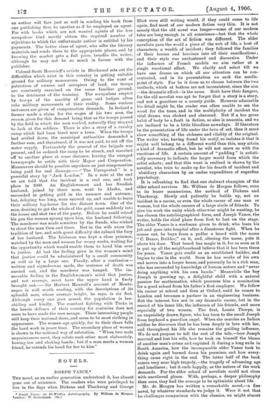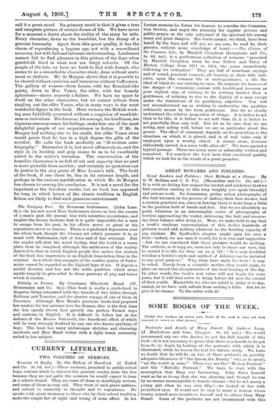NOVELS.
JOSEPH VANCE.*
THE novel, as an earlier generation understood it, has almost gone out of existence. The readers who were privileged to live in the days when Dickens and Thackeray and George
* Joseph Vance: an TB-Written Autobiography. By William de Morgan. London : W. Heinemann. 16E41
Eliot were still writing would, if they could come to life again, find most of our modern fiction very thin. It is not merely that the old novel was longer—some of our modern tales are long enough in all conscience—but that the whole conception of the art of fiction was different. The elder novelists gave the world a piece of the web of life, a host of characters, a wealth of incident; they followed the families of their heroes and heroines into all their ramifications ; and their style was unchastened and discursive. Under the influence of French models we aim rather at a single emotional effect. We clarify and select till we have one drama on which all our attention can be con- centrated, and in its presentation we seek the needle- point of style. Far be it from us to choose between the two methods, which at bottom are not inconsistent, since the aim —the dramatic effect—is the same. Both have their dangers, for the old novelist was apt to forget that a story is a story, and not a gazetteer or a county guide. However admirable his detail might be, the reader was often unable to see the wood for the trees, and in the multiplicity of incident the vital drama was choked and obscured. But if a too gross habit of body be a fault in fiction, so also is anaemia, and we are inclined to be a little bloodless nowadays. If literature be the presentation of life under the laws of art, then it must show something of the richness and vitality of the original. The writer who, having found his motif, so isolates it that it might well belong to a different world than this, may attain a kind of dramatic effect, but he will not move us with the emotions of life. A certain amount of " padding " is artisti- cally necessary to indicate the larger world from which the artist selects; and that this want is realised is shown by the novelist, who tries to make up for his dearth of incident and ubsidiary characters by an undue expenditure of superfine psychology.
It is refreshing to find that one stalwart champion of the older school survives. Mr. William de Morgan follows, even to its lesser mannerisms, the method of Dickens and Thackeray. Slowly and patiently be builds up, not an incident in a career, or even the whole career of one man or woman, but the whole careers of a large circle of friends. To give his work the unity which otherwise might be wanting, he has chosen the autobiographical form, and Joseph Vance, the writer, holds the chief place from first to last on the stage. The elder Vance is a, workman given to drink, who loses his job and goes into hospital after a disastrous fight. When he comes out, he buys from a pedlar a board with the name "C. Dance, Builder," on it, and, altering the name, puts it above his door. That board has magic in it, for as soon as it is put up all the neighbourhood believe that it has been there for years. Vance gets credit as an established builder, and begins to rise in the world. Soon he has works of his own and moves into a larger house, and presently he is a rich man, who has succeeded by knowledge of human nature and "never doing anything with his own hands." Meanwhile the boy Joseph is growing up, a delightful child with a natural passion for mathematics, which procures him a nomination for a good school from his father's first employer. We follow his career at school and then at Oxford, until he comes to London and becomes a partner in an engineering business. But the interest lies not in any dramatic career, but in the record of his inner life, the influence of his friends, and more especially of two women. The first, Lossie Thorpe, is an exquisitely drawn figure, who has been to the small Joseph from boyhood a guardian angel. When she marries an Indian soldier he discovers that be has been deeply in love with her, and throughout his life she remains the guiding influence. We do not propose to tell the rest of the tale,—how Joseph married and lost his wife, bow be took on himself the blame of another man's crime and expiated it during a long exile in South America, how the incomparable elder Vance took to drink again and burned down his premises, and how every- thing came right in the end. The latter half of the book comes very near high tragedy,—the tragedy of advancing age andloneliness ; but it ends happily, as the nature of the work. demands. For the elder school of novelists could not close with unrelieved gloom. With, perhaps, a deeper philosophy than ours, they had the courage to be optimistic about life.
Mr. de Morgan has written a remarkable novel,—a fine novel, by whatever standards we judge it. Were it not that he challenges comparison with the classics, we might almost Call it a great novel. Its primary merit is that it gives a true and complete picture of certain forms of life. We have never for a moment a doubt about the reality of the story he tells. Every character, down to the humblest, has the stamp of a genuine humanity. Apart from this great quality, it has the charm of reproducing a bygone age, not with a secondhand accuracy, but with full and intimate understanding. Londoners cannot fail to find pleasure in this picture of the days when gentlefolk lived in what now are dingy suburbs. Of the people of the tale, we have no fault to find with Joseph, who 'seems to us a remarkable character-study, done without senti- ment or rhetoric. Mr. de Morgan shows that it is possible to be shrewd without cynicism and humorous without buffoonery. The gallery of women—from Lossie, with her Rosalind-like gaiety, down to Mrs. Vance, the elder, with her homely aphorisms—shows scarcely a failure. We have no space to dwell on the other characters, but we cannot refrain from 'singling out the elder Vance, who in many ways is the most wonderful figure in the book. Here we have the British work- ing man faithfully presented without a suspicion of mawkish- ness or caricature. His humour, his courage, his kindliness, his vigorous common-sense, his failings, make him one of the most delightful people of our acquaintance in fiction. If Mr. de Morgan hadnething else to his credit, the elder Vance alone would prove that he has in a high degree the gifts of the novelist. He calls the book modestly an " auto- biography." Discursive it is, but never offensively so, and the style in its lucidity and grip seems to us to be excellently suited to the writer's intention. The conversation of the homelier characters is so full of wit and sagacity that no part is more quotable than another; and certainly no quotation can do justice to the airy grace of Miss Lossie's talk. The fault of the book, if one there be, lies in its extreme length, and perhaps in the curious mystification in which Mr. de Morgan has chosen to enwrap his conclusion. It is not a novel for the impatient or the frivolous reader, but no book has appeared for long in which lovers of the classic tradition in English fiction are likely to find such generous entertaiment.







































 Previous page
Previous page